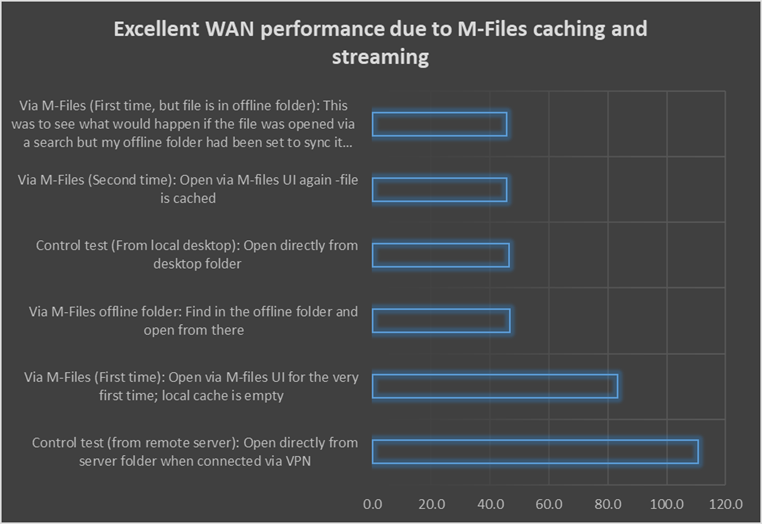Systems are either provided as hardware that is installed at each key office, or as software that is linked to its own cache; a fast disk to hold the localized cache.
WAN accelerators are not cheap, so they are typically only adopted by medium to large businesses that can justify the cost, so imagine the delight of even our smallest customers when they realised that they are getting this capability free-of-charge.
How come it is free?
Customers use our Excitech DOCS add-on to M-Files to automate processes such as ISO 19650 naming & workflows, manage versioning, approvals and internal procedures. They didn’t buy the system to accelerate their document open and save performance, this is just a very helpful by-product of using M-Files as the engine.
M-Files has some neat tricks up its sleeve and three that make a big difference in this area are:
- Streaming
- Caching
- Mark for off-line availability
We knew it made things faster as we use the software ourselves, but we had become used to the performance and until we conducted our own tests, we had no measure for the difference it makes – see the graph below.

Streaming
When you open a file across the network, your computer is sent the first packet of data and the server waits for a response before sending the next one. This send and wait for confirmation gets worse the further the devices are from each other, which is why opening a large file takes an eternity if the server is in London and you are in Australia.
Streaming sends a continuous stream of data. This is what allows you to pick a movie in something like Netflix and start watching it straight away; if you had to download it first you would get very frustrated.
M-Files has its own in-built streaming, so videos play instantly but the streaming also accelerates the download of any files. Our tests were with a 160Mb Excel spreadsheet and the server was just the other side of London so the differences and hence improvements were not as great as they would be over longer distances, but never-the-less there was a significant difference. Opening the file without M-Files streaming proved to be 33% slower.
Caching
Caching is the process of keeping a local copy of a file in case you want to open it again later. WAN accelerators maintain the cache on a device/server in the local office. If the master copy of the file is updated on the main server, the local one will typically update too so that when you open the file it is offered from the local cache rather than being hauled across the network from the central server.
M-Files automatically maintains its own cache on desktops, tablets, and mobiles. When you attempt to open a file from the server, the system checks whether an identical version of the file is on your machine and opens it from there…instantly.
You can see this clearly in the graph above. Whether we opened the file directly from the Windows folder or from the M-Files server, the speed was the same.
This is free WAN acceleration!
Mark for off-line availability
This last feature is particularly useful for those who are either remote from the main data store or know that they will need quick access to certain content.
In M-Files you can right-click a document, folder or whole project and mark it for off-line availability. This will sync the content to your cache, and it will keep it up to date if files are added or changed.
This is not the same as checking documents out, as they are still available to your colleagues, but as you now have everything to do with the project local to you, when you open a file it’s instantaneous.
Conclusion
If you are looking for a WAN acceleration solution, you are probably not expecting a document management system to address that, similarly if you are planning to install a document management system you are probably not expecting it to resolve your WAN performance issues at the same time. In addition, you probably didn’t imagine that such a system would integrate with Microsoft SharePoint and Teams or with your CRM, time planning and financial systems, and you probably imagined that anything this capable would cost a whole lot more than £22/user/month.
M-Files is a pretty impressive product which is why we chose it as the basis of our AEC document management solution Excitech DOCS.
For more information on M-Files or Excitech DOCS; please visit our website or contact us at info@symetri.co.uk




